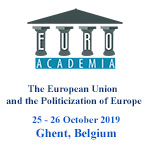Euroacademia Conferences
 Europe Inside-Out: Europe and Europeanness Exposed to Plural Observers (9th Edition) April 24 - 25, 2020
Europe Inside-Out: Europe and Europeanness Exposed to Plural Observers (9th Edition) April 24 - 25, 2020 Identities and Identifications: Politicized Uses of Collective Identities (9th Edition) June 12 - 13, 2020
Identities and Identifications: Politicized Uses of Collective Identities (9th Edition) June 12 - 13, 2020 8th Forum of Critical Studies: Asking Big Questions Again January 24 - 25, 2020
8th Forum of Critical Studies: Asking Big Questions Again January 24 - 25, 2020 Re-Inventing Eastern Europe (7th Edition) December 13 - 14, 2019
Re-Inventing Eastern Europe (7th Edition) December 13 - 14, 2019 The European Union and the Politicization of Europe (8th Edition) October 25 - 26, 2019
The European Union and the Politicization of Europe (8th Edition) October 25 - 26, 2019 Identities and Identifications: Politicized Uses of Collective Identities (8th Edition) June 28 - 29, 2019
Identities and Identifications: Politicized Uses of Collective Identities (8th Edition) June 28 - 29, 2019 The European Union and the Politicization of Europe (7th Edition) January 25 - 26, 2019
The European Union and the Politicization of Europe (7th Edition) January 25 - 26, 2019 7th Forum of Critical Studies: Asking Big Questions Again November 23 - 24, 2018
7th Forum of Critical Studies: Asking Big Questions Again November 23 - 24, 2018 Europe Inside-Out: Europe and Europeanness Exposed to Plural Observers (8th Edition) September 28 - 30, 2018
Europe Inside-Out: Europe and Europeanness Exposed to Plural Observers (8th Edition) September 28 - 30, 2018 Identities and Identifications: Politicized Uses of Collective Identities (7th Edition) June 14 - 15, 2018
Identities and Identifications: Politicized Uses of Collective Identities (7th Edition) June 14 - 15, 2018
Ordine Nuovo and the Idea of Europe
-
-

-
Presentation speakers
- Pier Paolo Alfei, School of Advanced Studies "Giacomo Leopardi", University of Macerata, Italy
Abstract:
From the experience of Centro Studi to the one of Movimento Politico, there is still no examination of all the press produced by Ordine Nuovo, that is the major European neo-fascist movement of the second half of the 20th century. In addition to a large amount of judicial documents, a precious source for the study of the movement is represented by a galaxy of newspapers printed between ’50s and ‘70s.Various periodicals were considered different «battle instruments» of the same ordinovist idea: “La Sfida”, “Giovinezza”, “Imperium”, “Ordine Nuovo”, “Ordine Nuovo Europeo”, “Italia giovane”, “L’Architrave”, “La Fenice”, “Legione Europa”, “Nazione Europa”, “Noi”, “Ordine Nuovo Azione”, “Anno Zero”; are all newspapers through which it is possible to analyze the revolutionary cultural battle carried on by Ordine Nuovo in the name of anti-communism, anti-Americanism and anti-Semitism for a new Europe. Through an analysis conducted between 2015 and 2019 with a critical-descriptive approach that considers all the articles published in over two decades in the newspapers connected to Ordine Nuovo, the aim of this paper is to detect similarities between the «battle for Europe» (Franco Mazzi, 1960) conducted by the militants of that movement and today’s radical right in Europe, by analyzing articles like Racism. Hope of Europe («Amaudruz», 1955) or For an Anti-democratic Europe (Silvio Vitale, 1957). Given that for a quarter of a century the Ordine Nuovo was in fact a standard-bearer for all the Italian nationalist-revolutionary alignment as regards the theorizing of a new Europe, fathom and study the press produced by this movement also allows on one side to frame the experience of other neo-fascist groups of the sixties and the seventies such as “Europa Combattente” and, on another side, to provide a reading key to examine the transition to armed struggle of the seventies.
-













